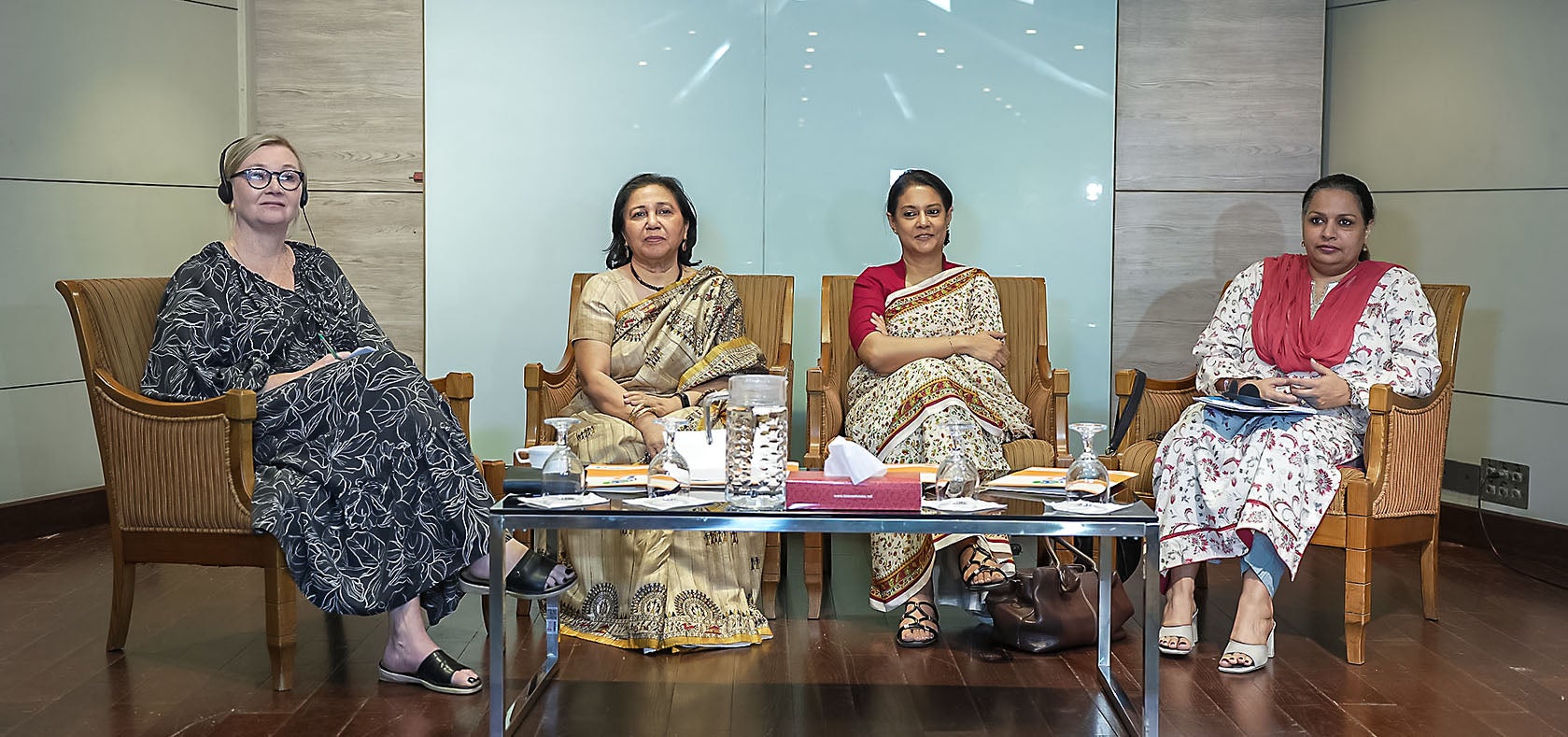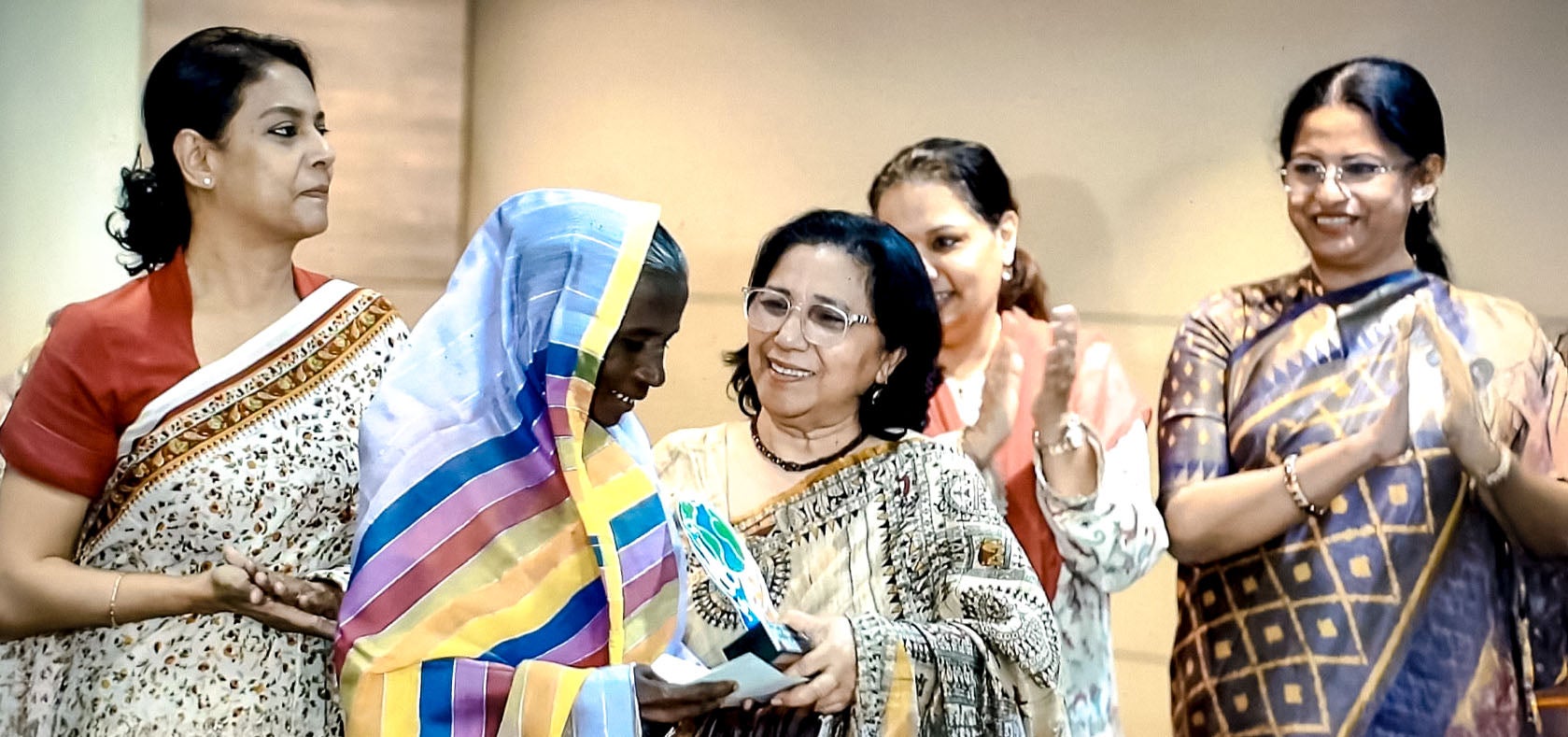Championing women’s role in community-led initiatives for climate action
Date:
Author: Kazi Rabeya Ame

Five local women leaders received the “Women's Role in Combating Climate Change Impact Award 2024,” for their impactful, community-driven climate adaptation initiatives at the “Annual Community of Practice (CoP) Network Convention held on 6 October 2024 in Dhaka, Bangladesh. Organized by the Manusher Jonno Foundation (MJF) with support from UN Women, the event brought together young women leaders and experts to strengthen women’s leadership in climate resilience and promote collaboration among civil society organizations (CSOs).
Shafali Begum, from Dewanganj, Jamalpur District, was honoured for her work as a midwife and founder of a community-based organization supporting pregnant women during emergencies and ensuring safe childbirth in floods. Rahima Khatun, also from Dewanganj, received recognition as a Community Disaster Response Volunteer for her leadership in crisis response during floods and cold waves. Suroti Begum, from Dewanganj, was celebrated for establishing a Personal Seed Bank to promote food security and build food resilience within her community. Rowshan Akter, from Chakaria, Cox’s Bazar, was acknowledged for her leadership in large-scale tree-plantation, promoting climate-adaptive agriculture and raising awareness on sustainable farming practices. Roshna Khatun, from Panchgachhi, Kurigram, was recognized for founding the Kuripata handloom artisan group, empowering around 40 women and girls with skills training and economic opportunities to support their families and build resilience.
“I have been volunteering for my community since adolescence, yet I have never received recognition for my efforts,” said Khatun, after receiving her award. “So, this moment is incredibly meaningful to me, as it confirms that I have truly made a positive impact on my community. I started a small initiative with only 10 women and adolescent girls, and today we are a group of 50. I want women from every household to be empowered.”

The Convention, organized under the ‘EmPower: Women for Climate Resilient Societies (Phase-II)’ project, funded by the Governments of Germany, Sweden and Switzerland and implemented by UN Women and MJF, also launched the “Women’s Climate Action Network (WCAN)”. This network of 100 grass-roots, women-led CSOs provides a unified voice to address violence and social discrimination intensified by climate change, and to influence gender-responsive climate policies and actions.
Syeda Rizwana Hasan, Adviser of the Ministry of Environment, Forest, Climate Change and Water Resources, highlighted the gender inequities in climate discussions. “The chapter on gender is always placed last in policy documents,” she noted, stressing the often-overlooked role of women who bear significant burdens from climate impacts. She said developed nations are responsible for funding climate resilience efforts in developing countries but often fall short. However, “Sweden is one of the countries that share the appropriate amount, as per the loss and damage policy,” she added.
Head of Development Cooperation at the Embassy of Sweden in Bangladesh, Maria Stridsman, said “Bangladesh’s responsibility for climate change is very minute. To deal with the effects of climate change, Bangladesh should receive support from countries that emit far more carbon than they do”.
Appreciating the role of grass-roots women leaders, UN Women Representative Gitanjali Singh said: “Bangladesh has long demonstrated that transformative adaptation can only happen through grass-roots women’s leadership. True transformation in climate resilience will only be possible if women’s perspectives are integrated into policymaking at all levels.”
Moving forward, UN Women will strengthen WCAN to amplify the voice and policy impact of women-led organizations.